International HRM Report: Cultural Differences and Impact
VerifiedAdded on 2022/12/19
|10
|2604
|90
Report
AI Summary
This report delves into the impact of cultural differences on international human resource management (IHRM) practices. It specifically examines how cultural nuances, particularly between Australia and Singapore, affect performance appraisal and recruitment and selection processes. The report highlights the importance of understanding cultural dimensions like power distance, individualism, masculinity, and uncertainty avoidance, as defined by Hofstede's cultural dimensions, to effectively manage employees across different cultural contexts. It argues that cultural differences significantly influence how employees' work is perceived and evaluated, as well as the criteria used for recruiting and selecting new hires. The report provides examples to illustrate how cultural values shape employee behavior, expectations, and preferences within the workplace, emphasizing the need for IHRM strategies to be adapted to specific cultural contexts to ensure fairness, effectiveness, and employee satisfaction. By understanding and addressing these cultural differences, organizations can improve their ability to retain talented employees, promote service excellence, and achieve their business objectives in a globalized world. The report underscores the importance of culturally sensitive IHRM practices for fostering a positive work environment and successful international business operations.
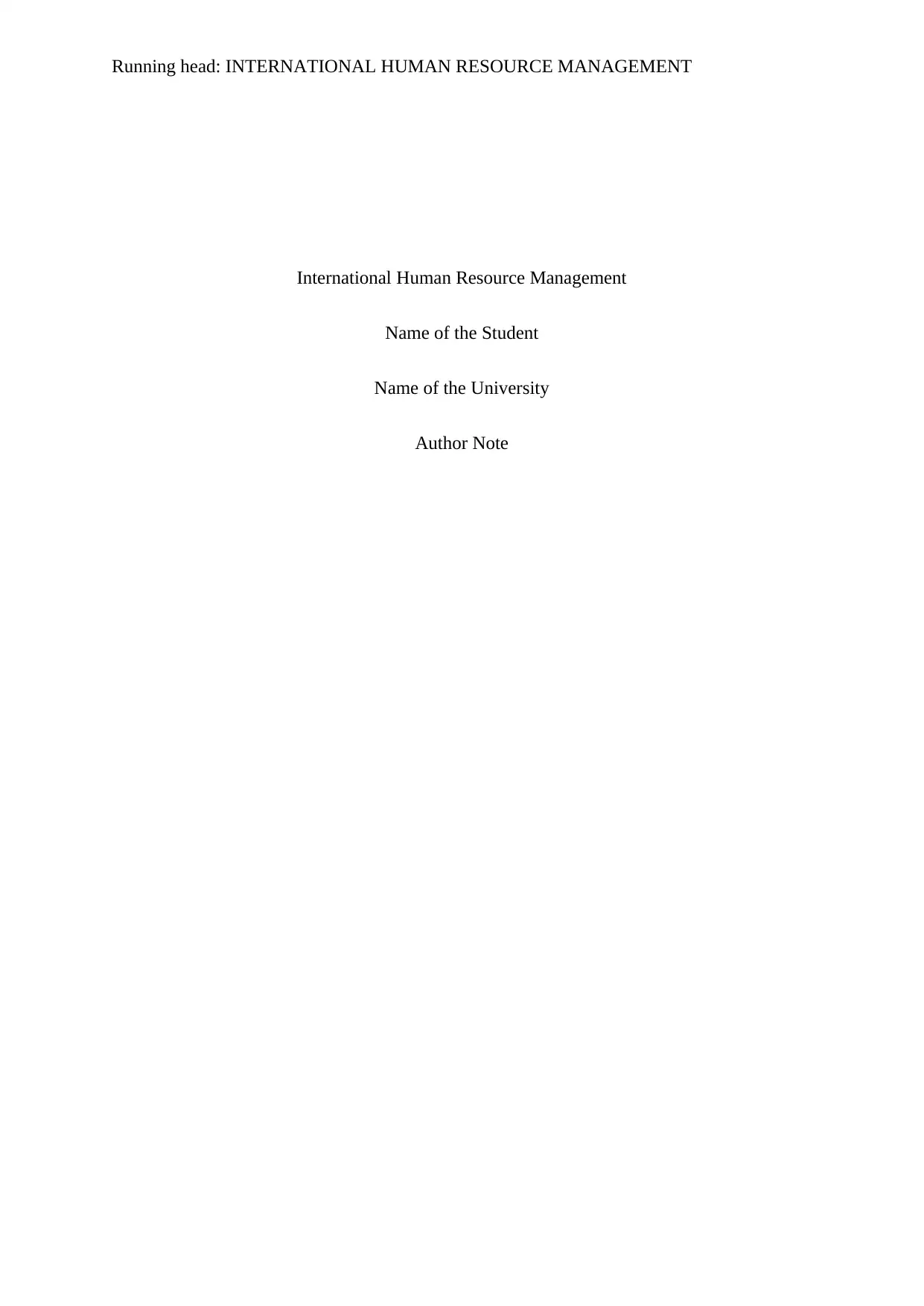
Running head: INTERNATIONAL HUMAN RESOURCE MANAGEMENT
International Human Resource Management
Name of the Student
Name of the University
Author Note
International Human Resource Management
Name of the Student
Name of the University
Author Note
Paraphrase This Document
Need a fresh take? Get an instant paraphrase of this document with our AI Paraphraser
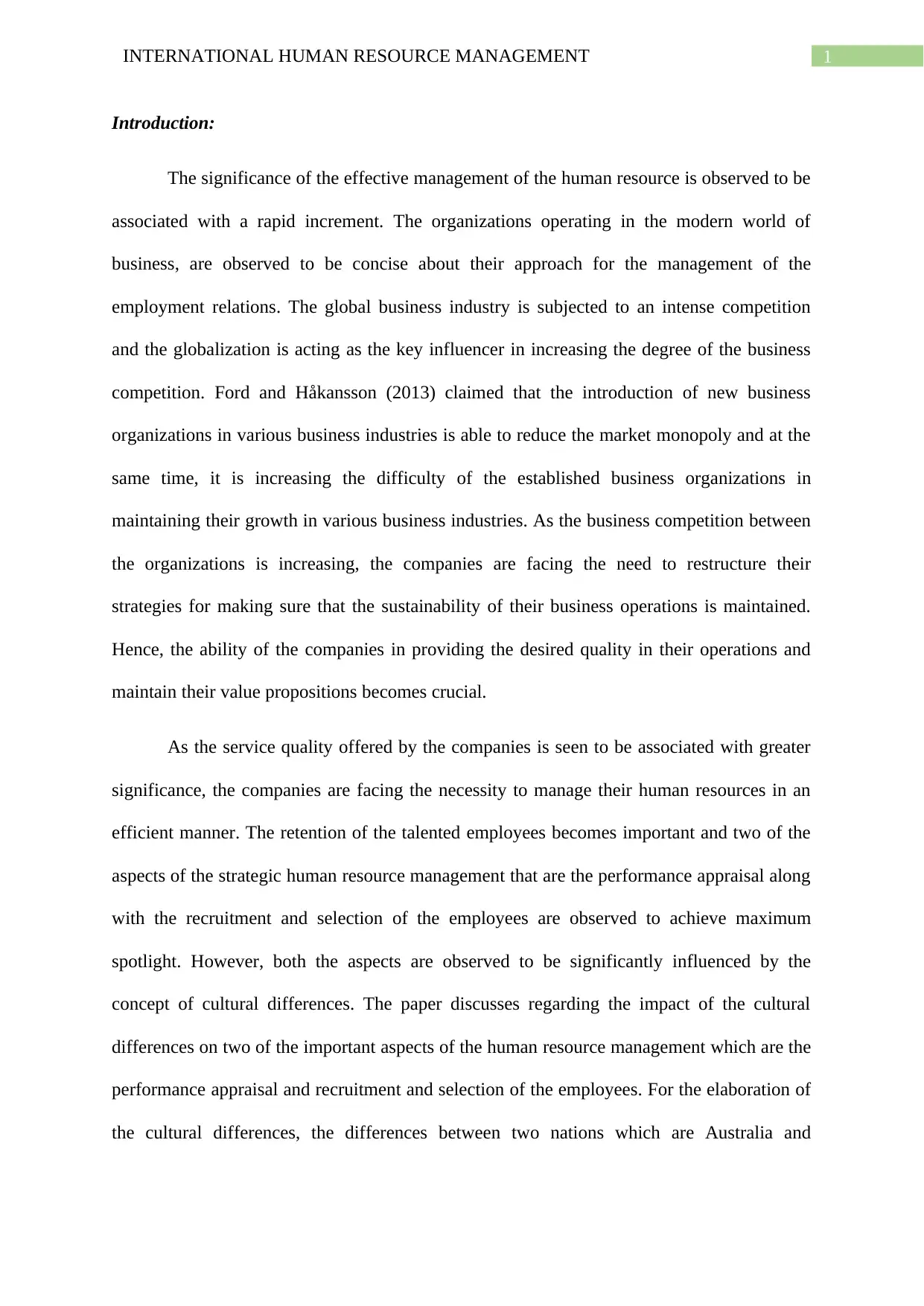
1INTERNATIONAL HUMAN RESOURCE MANAGEMENT
Introduction:
The significance of the effective management of the human resource is observed to be
associated with a rapid increment. The organizations operating in the modern world of
business, are observed to be concise about their approach for the management of the
employment relations. The global business industry is subjected to an intense competition
and the globalization is acting as the key influencer in increasing the degree of the business
competition. Ford and Håkansson (2013) claimed that the introduction of new business
organizations in various business industries is able to reduce the market monopoly and at the
same time, it is increasing the difficulty of the established business organizations in
maintaining their growth in various business industries. As the business competition between
the organizations is increasing, the companies are facing the need to restructure their
strategies for making sure that the sustainability of their business operations is maintained.
Hence, the ability of the companies in providing the desired quality in their operations and
maintain their value propositions becomes crucial.
As the service quality offered by the companies is seen to be associated with greater
significance, the companies are facing the necessity to manage their human resources in an
efficient manner. The retention of the talented employees becomes important and two of the
aspects of the strategic human resource management that are the performance appraisal along
with the recruitment and selection of the employees are observed to achieve maximum
spotlight. However, both the aspects are observed to be significantly influenced by the
concept of cultural differences. The paper discusses regarding the impact of the cultural
differences on two of the important aspects of the human resource management which are the
performance appraisal and recruitment and selection of the employees. For the elaboration of
the cultural differences, the differences between two nations which are Australia and
Introduction:
The significance of the effective management of the human resource is observed to be
associated with a rapid increment. The organizations operating in the modern world of
business, are observed to be concise about their approach for the management of the
employment relations. The global business industry is subjected to an intense competition
and the globalization is acting as the key influencer in increasing the degree of the business
competition. Ford and Håkansson (2013) claimed that the introduction of new business
organizations in various business industries is able to reduce the market monopoly and at the
same time, it is increasing the difficulty of the established business organizations in
maintaining their growth in various business industries. As the business competition between
the organizations is increasing, the companies are facing the need to restructure their
strategies for making sure that the sustainability of their business operations is maintained.
Hence, the ability of the companies in providing the desired quality in their operations and
maintain their value propositions becomes crucial.
As the service quality offered by the companies is seen to be associated with greater
significance, the companies are facing the necessity to manage their human resources in an
efficient manner. The retention of the talented employees becomes important and two of the
aspects of the strategic human resource management that are the performance appraisal along
with the recruitment and selection of the employees are observed to achieve maximum
spotlight. However, both the aspects are observed to be significantly influenced by the
concept of cultural differences. The paper discusses regarding the impact of the cultural
differences on two of the important aspects of the human resource management which are the
performance appraisal and recruitment and selection of the employees. For the elaboration of
the cultural differences, the differences between two nations which are Australia and
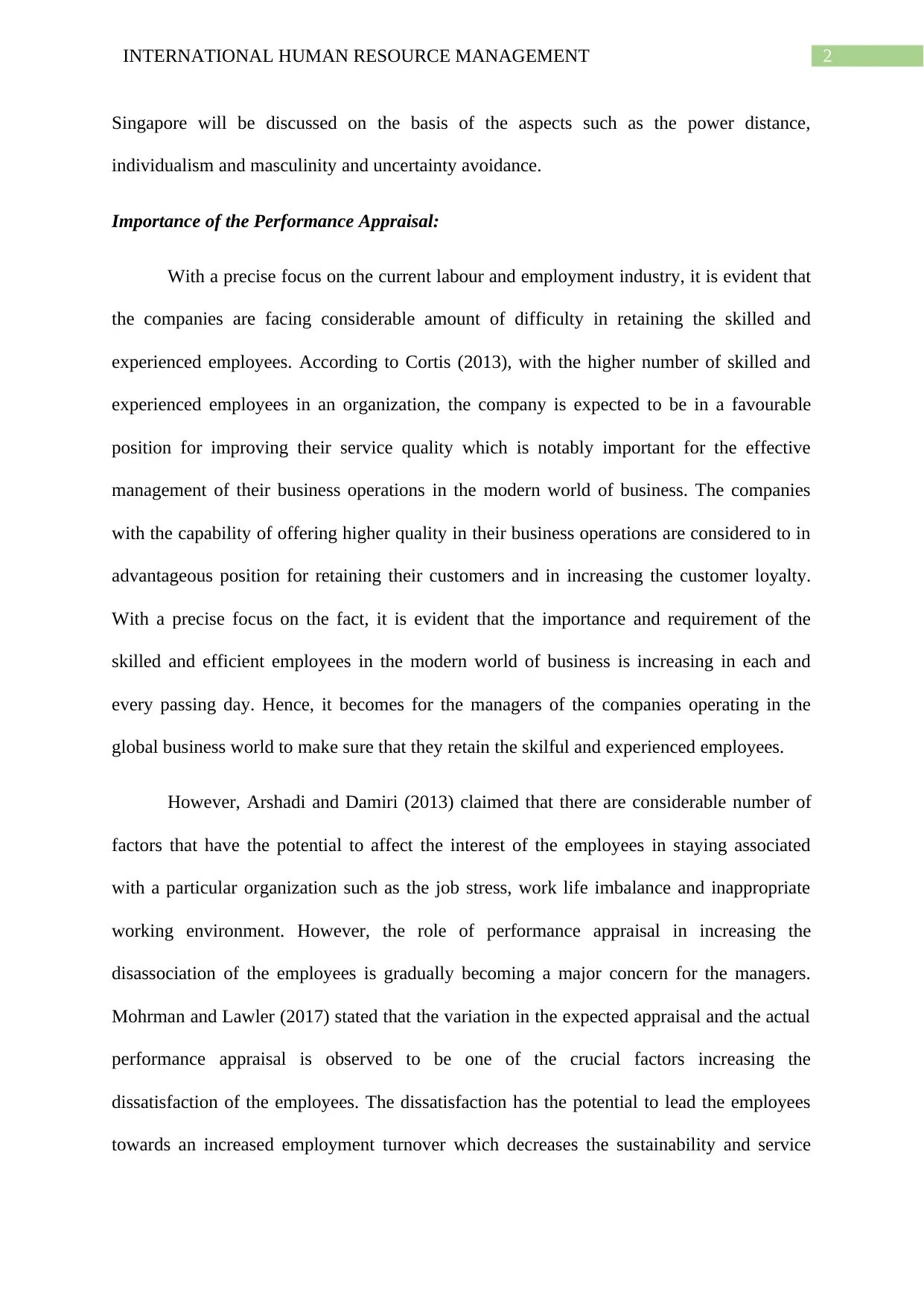
2INTERNATIONAL HUMAN RESOURCE MANAGEMENT
Singapore will be discussed on the basis of the aspects such as the power distance,
individualism and masculinity and uncertainty avoidance.
Importance of the Performance Appraisal:
With a precise focus on the current labour and employment industry, it is evident that
the companies are facing considerable amount of difficulty in retaining the skilled and
experienced employees. According to Cortis (2013), with the higher number of skilled and
experienced employees in an organization, the company is expected to be in a favourable
position for improving their service quality which is notably important for the effective
management of their business operations in the modern world of business. The companies
with the capability of offering higher quality in their business operations are considered to in
advantageous position for retaining their customers and in increasing the customer loyalty.
With a precise focus on the fact, it is evident that the importance and requirement of the
skilled and efficient employees in the modern world of business is increasing in each and
every passing day. Hence, it becomes for the managers of the companies operating in the
global business world to make sure that they retain the skilful and experienced employees.
However, Arshadi and Damiri (2013) claimed that there are considerable number of
factors that have the potential to affect the interest of the employees in staying associated
with a particular organization such as the job stress, work life imbalance and inappropriate
working environment. However, the role of performance appraisal in increasing the
disassociation of the employees is gradually becoming a major concern for the managers.
Mohrman and Lawler (2017) stated that the variation in the expected appraisal and the actual
performance appraisal is observed to be one of the crucial factors increasing the
dissatisfaction of the employees. The dissatisfaction has the potential to lead the employees
towards an increased employment turnover which decreases the sustainability and service
Singapore will be discussed on the basis of the aspects such as the power distance,
individualism and masculinity and uncertainty avoidance.
Importance of the Performance Appraisal:
With a precise focus on the current labour and employment industry, it is evident that
the companies are facing considerable amount of difficulty in retaining the skilled and
experienced employees. According to Cortis (2013), with the higher number of skilled and
experienced employees in an organization, the company is expected to be in a favourable
position for improving their service quality which is notably important for the effective
management of their business operations in the modern world of business. The companies
with the capability of offering higher quality in their business operations are considered to in
advantageous position for retaining their customers and in increasing the customer loyalty.
With a precise focus on the fact, it is evident that the importance and requirement of the
skilled and efficient employees in the modern world of business is increasing in each and
every passing day. Hence, it becomes for the managers of the companies operating in the
global business world to make sure that they retain the skilful and experienced employees.
However, Arshadi and Damiri (2013) claimed that there are considerable number of
factors that have the potential to affect the interest of the employees in staying associated
with a particular organization such as the job stress, work life imbalance and inappropriate
working environment. However, the role of performance appraisal in increasing the
disassociation of the employees is gradually becoming a major concern for the managers.
Mohrman and Lawler (2017) stated that the variation in the expected appraisal and the actual
performance appraisal is observed to be one of the crucial factors increasing the
dissatisfaction of the employees. The dissatisfaction has the potential to lead the employees
towards an increased employment turnover which decreases the sustainability and service
⊘ This is a preview!⊘
Do you want full access?
Subscribe today to unlock all pages.

Trusted by 1+ million students worldwide
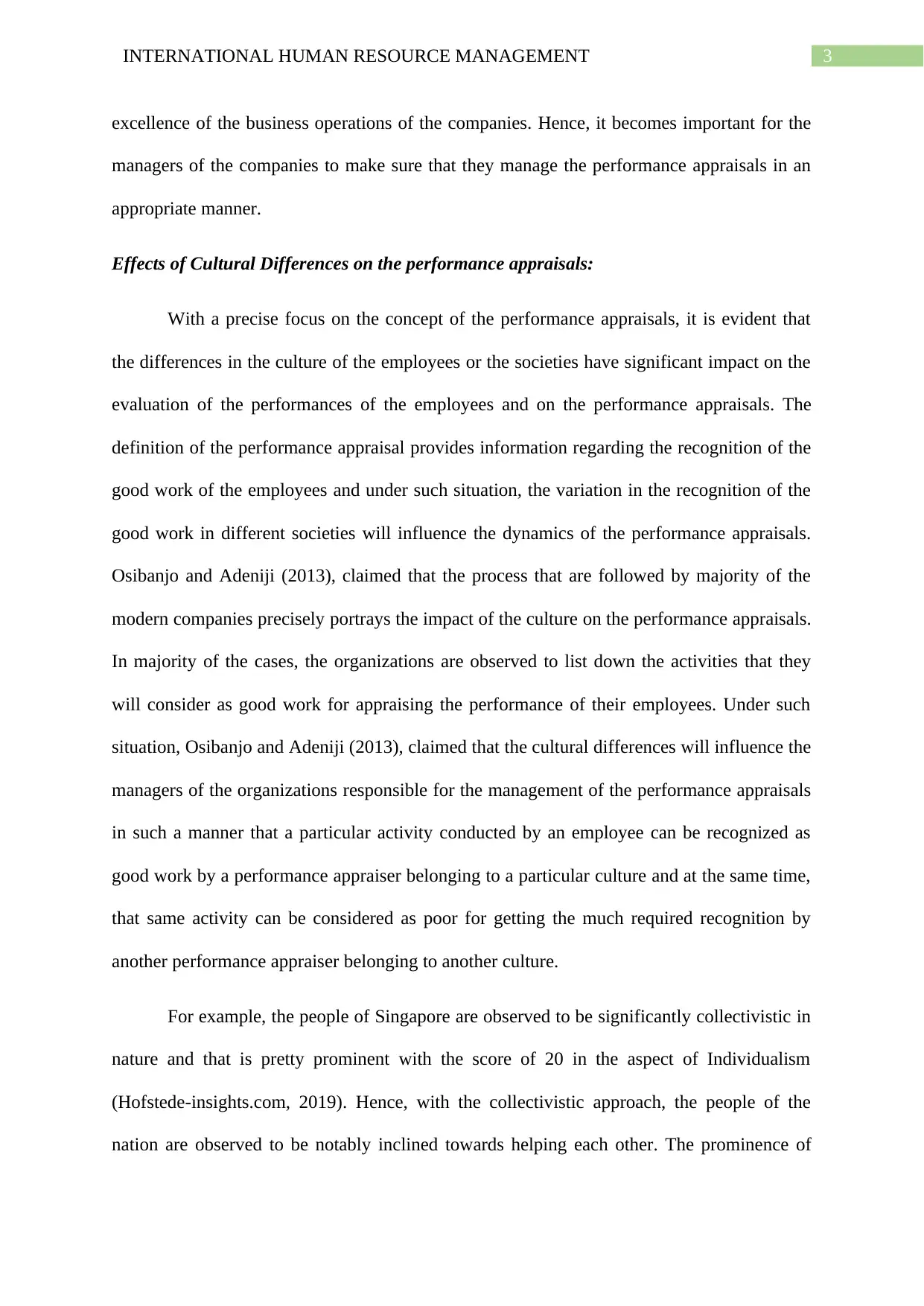
3INTERNATIONAL HUMAN RESOURCE MANAGEMENT
excellence of the business operations of the companies. Hence, it becomes important for the
managers of the companies to make sure that they manage the performance appraisals in an
appropriate manner.
Effects of Cultural Differences on the performance appraisals:
With a precise focus on the concept of the performance appraisals, it is evident that
the differences in the culture of the employees or the societies have significant impact on the
evaluation of the performances of the employees and on the performance appraisals. The
definition of the performance appraisal provides information regarding the recognition of the
good work of the employees and under such situation, the variation in the recognition of the
good work in different societies will influence the dynamics of the performance appraisals.
Osibanjo and Adeniji (2013), claimed that the process that are followed by majority of the
modern companies precisely portrays the impact of the culture on the performance appraisals.
In majority of the cases, the organizations are observed to list down the activities that they
will consider as good work for appraising the performance of their employees. Under such
situation, Osibanjo and Adeniji (2013), claimed that the cultural differences will influence the
managers of the organizations responsible for the management of the performance appraisals
in such a manner that a particular activity conducted by an employee can be recognized as
good work by a performance appraiser belonging to a particular culture and at the same time,
that same activity can be considered as poor for getting the much required recognition by
another performance appraiser belonging to another culture.
For example, the people of Singapore are observed to be significantly collectivistic in
nature and that is pretty prominent with the score of 20 in the aspect of Individualism
(Hofstede-insights.com, 2019). Hence, with the collectivistic approach, the people of the
nation are observed to be notably inclined towards helping each other. The prominence of
excellence of the business operations of the companies. Hence, it becomes important for the
managers of the companies to make sure that they manage the performance appraisals in an
appropriate manner.
Effects of Cultural Differences on the performance appraisals:
With a precise focus on the concept of the performance appraisals, it is evident that
the differences in the culture of the employees or the societies have significant impact on the
evaluation of the performances of the employees and on the performance appraisals. The
definition of the performance appraisal provides information regarding the recognition of the
good work of the employees and under such situation, the variation in the recognition of the
good work in different societies will influence the dynamics of the performance appraisals.
Osibanjo and Adeniji (2013), claimed that the process that are followed by majority of the
modern companies precisely portrays the impact of the culture on the performance appraisals.
In majority of the cases, the organizations are observed to list down the activities that they
will consider as good work for appraising the performance of their employees. Under such
situation, Osibanjo and Adeniji (2013), claimed that the cultural differences will influence the
managers of the organizations responsible for the management of the performance appraisals
in such a manner that a particular activity conducted by an employee can be recognized as
good work by a performance appraiser belonging to a particular culture and at the same time,
that same activity can be considered as poor for getting the much required recognition by
another performance appraiser belonging to another culture.
For example, the people of Singapore are observed to be significantly collectivistic in
nature and that is pretty prominent with the score of 20 in the aspect of Individualism
(Hofstede-insights.com, 2019). Hence, with the collectivistic approach, the people of the
nation are observed to be notably inclined towards helping each other. The prominence of
Paraphrase This Document
Need a fresh take? Get an instant paraphrase of this document with our AI Paraphraser
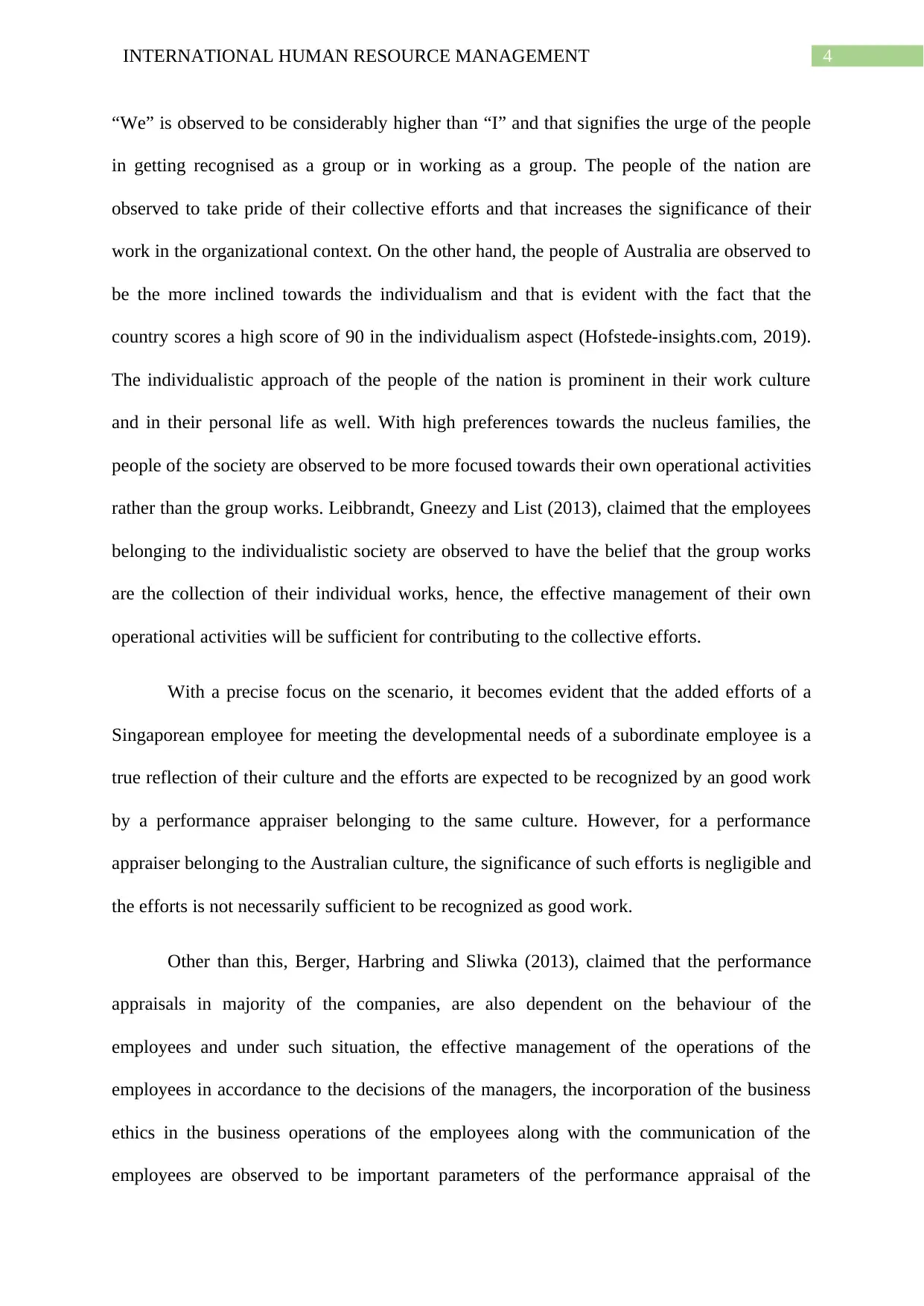
4INTERNATIONAL HUMAN RESOURCE MANAGEMENT
“We” is observed to be considerably higher than “I” and that signifies the urge of the people
in getting recognised as a group or in working as a group. The people of the nation are
observed to take pride of their collective efforts and that increases the significance of their
work in the organizational context. On the other hand, the people of Australia are observed to
be the more inclined towards the individualism and that is evident with the fact that the
country scores a high score of 90 in the individualism aspect (Hofstede-insights.com, 2019).
The individualistic approach of the people of the nation is prominent in their work culture
and in their personal life as well. With high preferences towards the nucleus families, the
people of the society are observed to be more focused towards their own operational activities
rather than the group works. Leibbrandt, Gneezy and List (2013), claimed that the employees
belonging to the individualistic society are observed to have the belief that the group works
are the collection of their individual works, hence, the effective management of their own
operational activities will be sufficient for contributing to the collective efforts.
With a precise focus on the scenario, it becomes evident that the added efforts of a
Singaporean employee for meeting the developmental needs of a subordinate employee is a
true reflection of their culture and the efforts are expected to be recognized by an good work
by a performance appraiser belonging to the same culture. However, for a performance
appraiser belonging to the Australian culture, the significance of such efforts is negligible and
the efforts is not necessarily sufficient to be recognized as good work.
Other than this, Berger, Harbring and Sliwka (2013), claimed that the performance
appraisals in majority of the companies, are also dependent on the behaviour of the
employees and under such situation, the effective management of the operations of the
employees in accordance to the decisions of the managers, the incorporation of the business
ethics in the business operations of the employees along with the communication of the
employees are observed to be important parameters of the performance appraisal of the
“We” is observed to be considerably higher than “I” and that signifies the urge of the people
in getting recognised as a group or in working as a group. The people of the nation are
observed to take pride of their collective efforts and that increases the significance of their
work in the organizational context. On the other hand, the people of Australia are observed to
be the more inclined towards the individualism and that is evident with the fact that the
country scores a high score of 90 in the individualism aspect (Hofstede-insights.com, 2019).
The individualistic approach of the people of the nation is prominent in their work culture
and in their personal life as well. With high preferences towards the nucleus families, the
people of the society are observed to be more focused towards their own operational activities
rather than the group works. Leibbrandt, Gneezy and List (2013), claimed that the employees
belonging to the individualistic society are observed to have the belief that the group works
are the collection of their individual works, hence, the effective management of their own
operational activities will be sufficient for contributing to the collective efforts.
With a precise focus on the scenario, it becomes evident that the added efforts of a
Singaporean employee for meeting the developmental needs of a subordinate employee is a
true reflection of their culture and the efforts are expected to be recognized by an good work
by a performance appraiser belonging to the same culture. However, for a performance
appraiser belonging to the Australian culture, the significance of such efforts is negligible and
the efforts is not necessarily sufficient to be recognized as good work.
Other than this, Berger, Harbring and Sliwka (2013), claimed that the performance
appraisals in majority of the companies, are also dependent on the behaviour of the
employees and under such situation, the effective management of the operations of the
employees in accordance to the decisions of the managers, the incorporation of the business
ethics in the business operations of the employees along with the communication of the
employees are observed to be important parameters of the performance appraisal of the
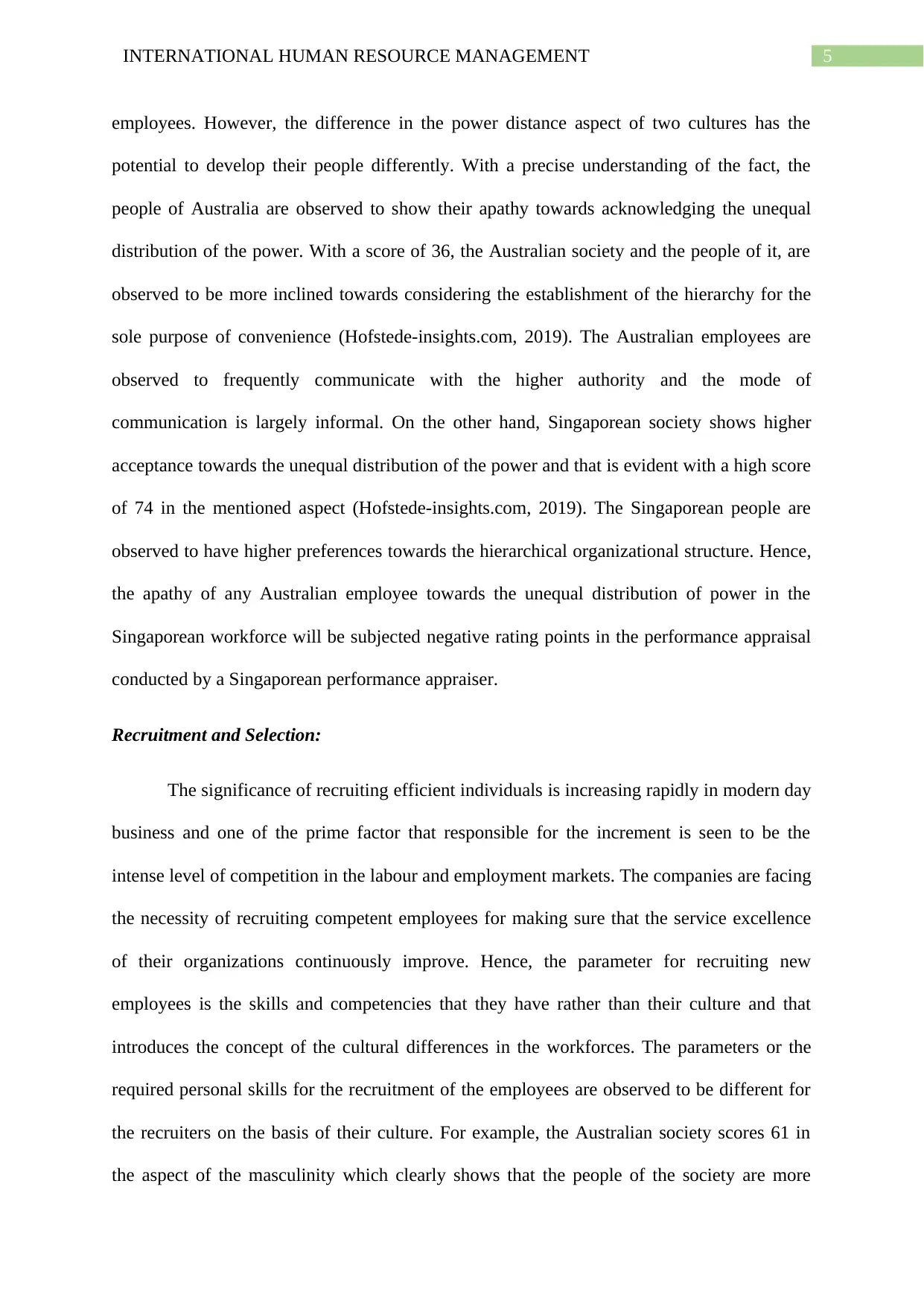
5INTERNATIONAL HUMAN RESOURCE MANAGEMENT
employees. However, the difference in the power distance aspect of two cultures has the
potential to develop their people differently. With a precise understanding of the fact, the
people of Australia are observed to show their apathy towards acknowledging the unequal
distribution of the power. With a score of 36, the Australian society and the people of it, are
observed to be more inclined towards considering the establishment of the hierarchy for the
sole purpose of convenience (Hofstede-insights.com, 2019). The Australian employees are
observed to frequently communicate with the higher authority and the mode of
communication is largely informal. On the other hand, Singaporean society shows higher
acceptance towards the unequal distribution of the power and that is evident with a high score
of 74 in the mentioned aspect (Hofstede-insights.com, 2019). The Singaporean people are
observed to have higher preferences towards the hierarchical organizational structure. Hence,
the apathy of any Australian employee towards the unequal distribution of power in the
Singaporean workforce will be subjected negative rating points in the performance appraisal
conducted by a Singaporean performance appraiser.
Recruitment and Selection:
The significance of recruiting efficient individuals is increasing rapidly in modern day
business and one of the prime factor that responsible for the increment is seen to be the
intense level of competition in the labour and employment markets. The companies are facing
the necessity of recruiting competent employees for making sure that the service excellence
of their organizations continuously improve. Hence, the parameter for recruiting new
employees is the skills and competencies that they have rather than their culture and that
introduces the concept of the cultural differences in the workforces. The parameters or the
required personal skills for the recruitment of the employees are observed to be different for
the recruiters on the basis of their culture. For example, the Australian society scores 61 in
the aspect of the masculinity which clearly shows that the people of the society are more
employees. However, the difference in the power distance aspect of two cultures has the
potential to develop their people differently. With a precise understanding of the fact, the
people of Australia are observed to show their apathy towards acknowledging the unequal
distribution of the power. With a score of 36, the Australian society and the people of it, are
observed to be more inclined towards considering the establishment of the hierarchy for the
sole purpose of convenience (Hofstede-insights.com, 2019). The Australian employees are
observed to frequently communicate with the higher authority and the mode of
communication is largely informal. On the other hand, Singaporean society shows higher
acceptance towards the unequal distribution of the power and that is evident with a high score
of 74 in the mentioned aspect (Hofstede-insights.com, 2019). The Singaporean people are
observed to have higher preferences towards the hierarchical organizational structure. Hence,
the apathy of any Australian employee towards the unequal distribution of power in the
Singaporean workforce will be subjected negative rating points in the performance appraisal
conducted by a Singaporean performance appraiser.
Recruitment and Selection:
The significance of recruiting efficient individuals is increasing rapidly in modern day
business and one of the prime factor that responsible for the increment is seen to be the
intense level of competition in the labour and employment markets. The companies are facing
the necessity of recruiting competent employees for making sure that the service excellence
of their organizations continuously improve. Hence, the parameter for recruiting new
employees is the skills and competencies that they have rather than their culture and that
introduces the concept of the cultural differences in the workforces. The parameters or the
required personal skills for the recruitment of the employees are observed to be different for
the recruiters on the basis of their culture. For example, the Australian society scores 61 in
the aspect of the masculinity which clearly shows that the people of the society are more
⊘ This is a preview!⊘
Do you want full access?
Subscribe today to unlock all pages.

Trusted by 1+ million students worldwide
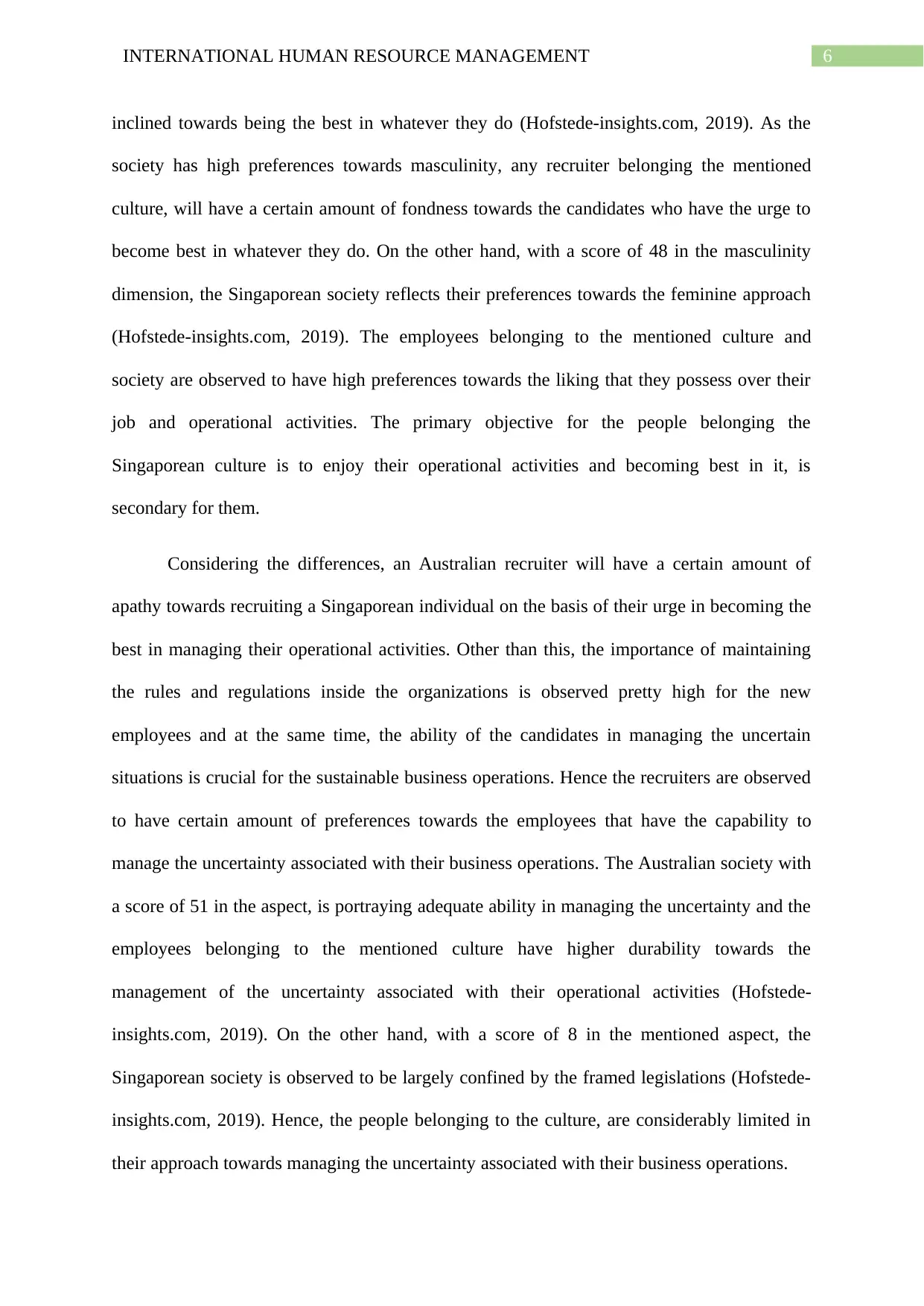
6INTERNATIONAL HUMAN RESOURCE MANAGEMENT
inclined towards being the best in whatever they do (Hofstede-insights.com, 2019). As the
society has high preferences towards masculinity, any recruiter belonging the mentioned
culture, will have a certain amount of fondness towards the candidates who have the urge to
become best in whatever they do. On the other hand, with a score of 48 in the masculinity
dimension, the Singaporean society reflects their preferences towards the feminine approach
(Hofstede-insights.com, 2019). The employees belonging to the mentioned culture and
society are observed to have high preferences towards the liking that they possess over their
job and operational activities. The primary objective for the people belonging the
Singaporean culture is to enjoy their operational activities and becoming best in it, is
secondary for them.
Considering the differences, an Australian recruiter will have a certain amount of
apathy towards recruiting a Singaporean individual on the basis of their urge in becoming the
best in managing their operational activities. Other than this, the importance of maintaining
the rules and regulations inside the organizations is observed pretty high for the new
employees and at the same time, the ability of the candidates in managing the uncertain
situations is crucial for the sustainable business operations. Hence the recruiters are observed
to have certain amount of preferences towards the employees that have the capability to
manage the uncertainty associated with their business operations. The Australian society with
a score of 51 in the aspect, is portraying adequate ability in managing the uncertainty and the
employees belonging to the mentioned culture have higher durability towards the
management of the uncertainty associated with their operational activities (Hofstede-
insights.com, 2019). On the other hand, with a score of 8 in the mentioned aspect, the
Singaporean society is observed to be largely confined by the framed legislations (Hofstede-
insights.com, 2019). Hence, the people belonging to the culture, are considerably limited in
their approach towards managing the uncertainty associated with their business operations.
inclined towards being the best in whatever they do (Hofstede-insights.com, 2019). As the
society has high preferences towards masculinity, any recruiter belonging the mentioned
culture, will have a certain amount of fondness towards the candidates who have the urge to
become best in whatever they do. On the other hand, with a score of 48 in the masculinity
dimension, the Singaporean society reflects their preferences towards the feminine approach
(Hofstede-insights.com, 2019). The employees belonging to the mentioned culture and
society are observed to have high preferences towards the liking that they possess over their
job and operational activities. The primary objective for the people belonging the
Singaporean culture is to enjoy their operational activities and becoming best in it, is
secondary for them.
Considering the differences, an Australian recruiter will have a certain amount of
apathy towards recruiting a Singaporean individual on the basis of their urge in becoming the
best in managing their operational activities. Other than this, the importance of maintaining
the rules and regulations inside the organizations is observed pretty high for the new
employees and at the same time, the ability of the candidates in managing the uncertain
situations is crucial for the sustainable business operations. Hence the recruiters are observed
to have certain amount of preferences towards the employees that have the capability to
manage the uncertainty associated with their business operations. The Australian society with
a score of 51 in the aspect, is portraying adequate ability in managing the uncertainty and the
employees belonging to the mentioned culture have higher durability towards the
management of the uncertainty associated with their operational activities (Hofstede-
insights.com, 2019). On the other hand, with a score of 8 in the mentioned aspect, the
Singaporean society is observed to be largely confined by the framed legislations (Hofstede-
insights.com, 2019). Hence, the people belonging to the culture, are considerably limited in
their approach towards managing the uncertainty associated with their business operations.
Paraphrase This Document
Need a fresh take? Get an instant paraphrase of this document with our AI Paraphraser
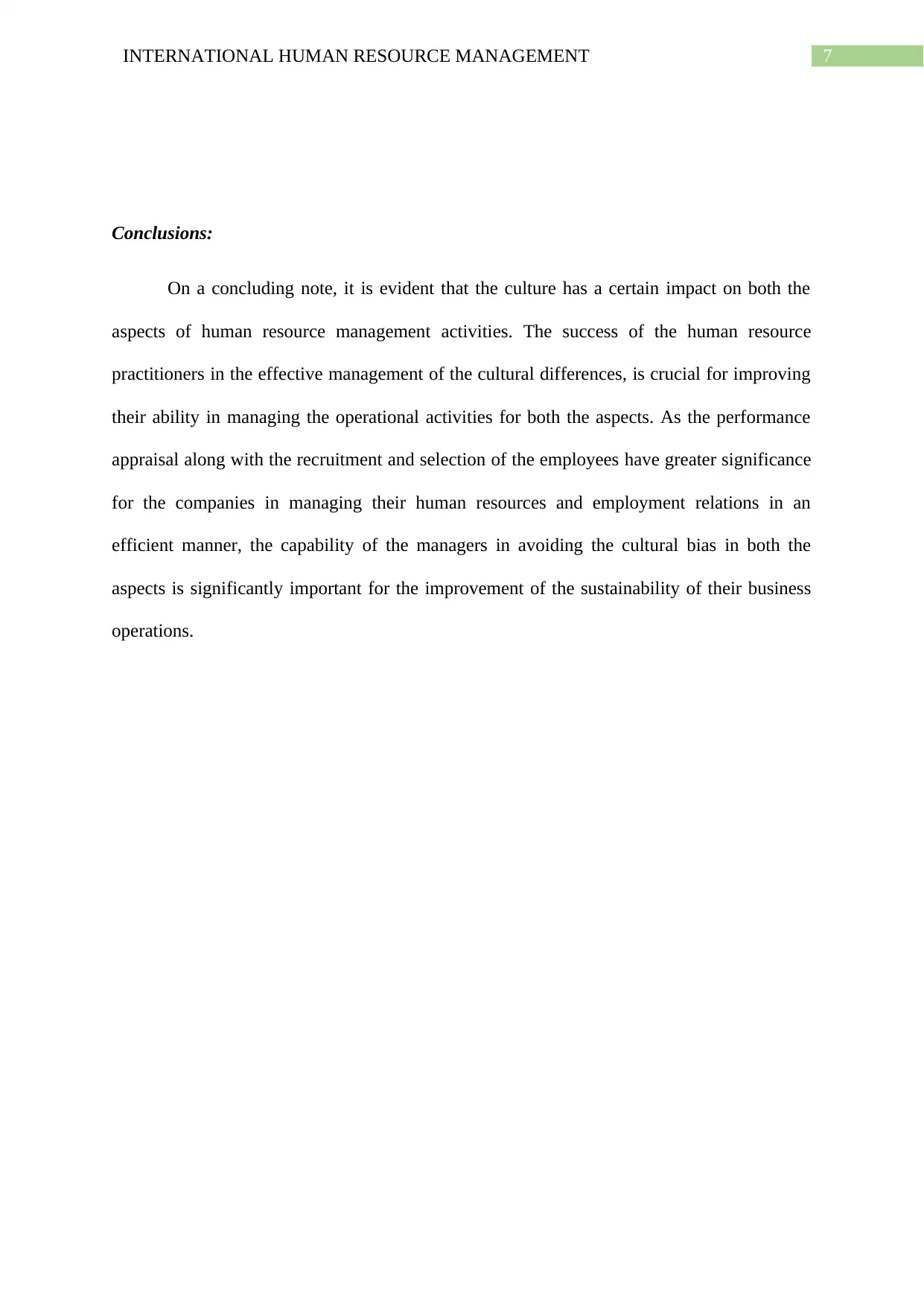
7INTERNATIONAL HUMAN RESOURCE MANAGEMENT
Conclusions:
On a concluding note, it is evident that the culture has a certain impact on both the
aspects of human resource management activities. The success of the human resource
practitioners in the effective management of the cultural differences, is crucial for improving
their ability in managing the operational activities for both the aspects. As the performance
appraisal along with the recruitment and selection of the employees have greater significance
for the companies in managing their human resources and employment relations in an
efficient manner, the capability of the managers in avoiding the cultural bias in both the
aspects is significantly important for the improvement of the sustainability of their business
operations.
Conclusions:
On a concluding note, it is evident that the culture has a certain impact on both the
aspects of human resource management activities. The success of the human resource
practitioners in the effective management of the cultural differences, is crucial for improving
their ability in managing the operational activities for both the aspects. As the performance
appraisal along with the recruitment and selection of the employees have greater significance
for the companies in managing their human resources and employment relations in an
efficient manner, the capability of the managers in avoiding the cultural bias in both the
aspects is significantly important for the improvement of the sustainability of their business
operations.
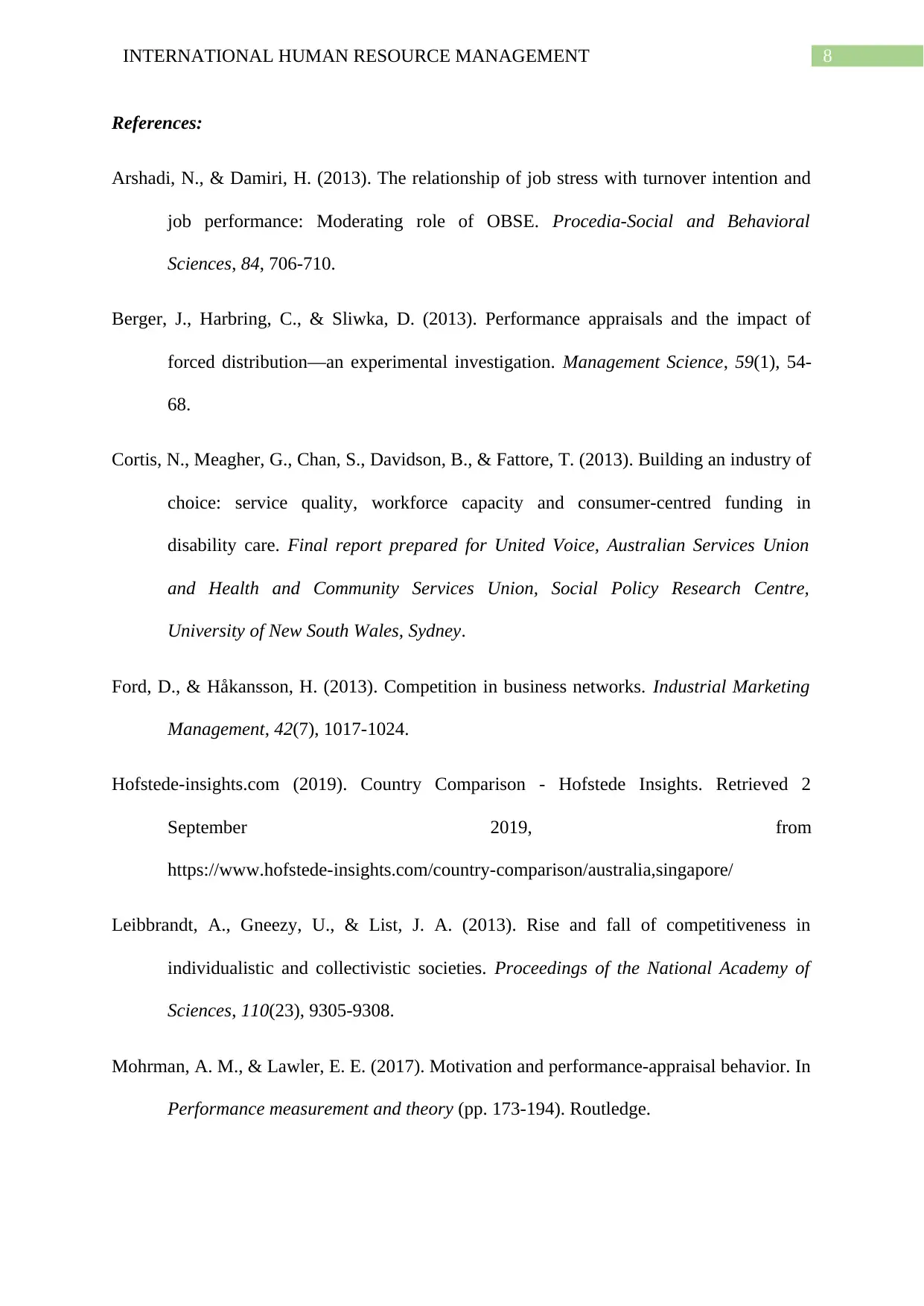
8INTERNATIONAL HUMAN RESOURCE MANAGEMENT
References:
Arshadi, N., & Damiri, H. (2013). The relationship of job stress with turnover intention and
job performance: Moderating role of OBSE. Procedia-Social and Behavioral
Sciences, 84, 706-710.
Berger, J., Harbring, C., & Sliwka, D. (2013). Performance appraisals and the impact of
forced distribution—an experimental investigation. Management Science, 59(1), 54-
68.
Cortis, N., Meagher, G., Chan, S., Davidson, B., & Fattore, T. (2013). Building an industry of
choice: service quality, workforce capacity and consumer-centred funding in
disability care. Final report prepared for United Voice, Australian Services Union
and Health and Community Services Union, Social Policy Research Centre,
University of New South Wales, Sydney.
Ford, D., & Håkansson, H. (2013). Competition in business networks. Industrial Marketing
Management, 42(7), 1017-1024.
Hofstede-insights.com (2019). Country Comparison - Hofstede Insights. Retrieved 2
September 2019, from
https://www.hofstede-insights.com/country-comparison/australia,singapore/
Leibbrandt, A., Gneezy, U., & List, J. A. (2013). Rise and fall of competitiveness in
individualistic and collectivistic societies. Proceedings of the National Academy of
Sciences, 110(23), 9305-9308.
Mohrman, A. M., & Lawler, E. E. (2017). Motivation and performance-appraisal behavior. In
Performance measurement and theory (pp. 173-194). Routledge.
References:
Arshadi, N., & Damiri, H. (2013). The relationship of job stress with turnover intention and
job performance: Moderating role of OBSE. Procedia-Social and Behavioral
Sciences, 84, 706-710.
Berger, J., Harbring, C., & Sliwka, D. (2013). Performance appraisals and the impact of
forced distribution—an experimental investigation. Management Science, 59(1), 54-
68.
Cortis, N., Meagher, G., Chan, S., Davidson, B., & Fattore, T. (2013). Building an industry of
choice: service quality, workforce capacity and consumer-centred funding in
disability care. Final report prepared for United Voice, Australian Services Union
and Health and Community Services Union, Social Policy Research Centre,
University of New South Wales, Sydney.
Ford, D., & Håkansson, H. (2013). Competition in business networks. Industrial Marketing
Management, 42(7), 1017-1024.
Hofstede-insights.com (2019). Country Comparison - Hofstede Insights. Retrieved 2
September 2019, from
https://www.hofstede-insights.com/country-comparison/australia,singapore/
Leibbrandt, A., Gneezy, U., & List, J. A. (2013). Rise and fall of competitiveness in
individualistic and collectivistic societies. Proceedings of the National Academy of
Sciences, 110(23), 9305-9308.
Mohrman, A. M., & Lawler, E. E. (2017). Motivation and performance-appraisal behavior. In
Performance measurement and theory (pp. 173-194). Routledge.
⊘ This is a preview!⊘
Do you want full access?
Subscribe today to unlock all pages.

Trusted by 1+ million students worldwide
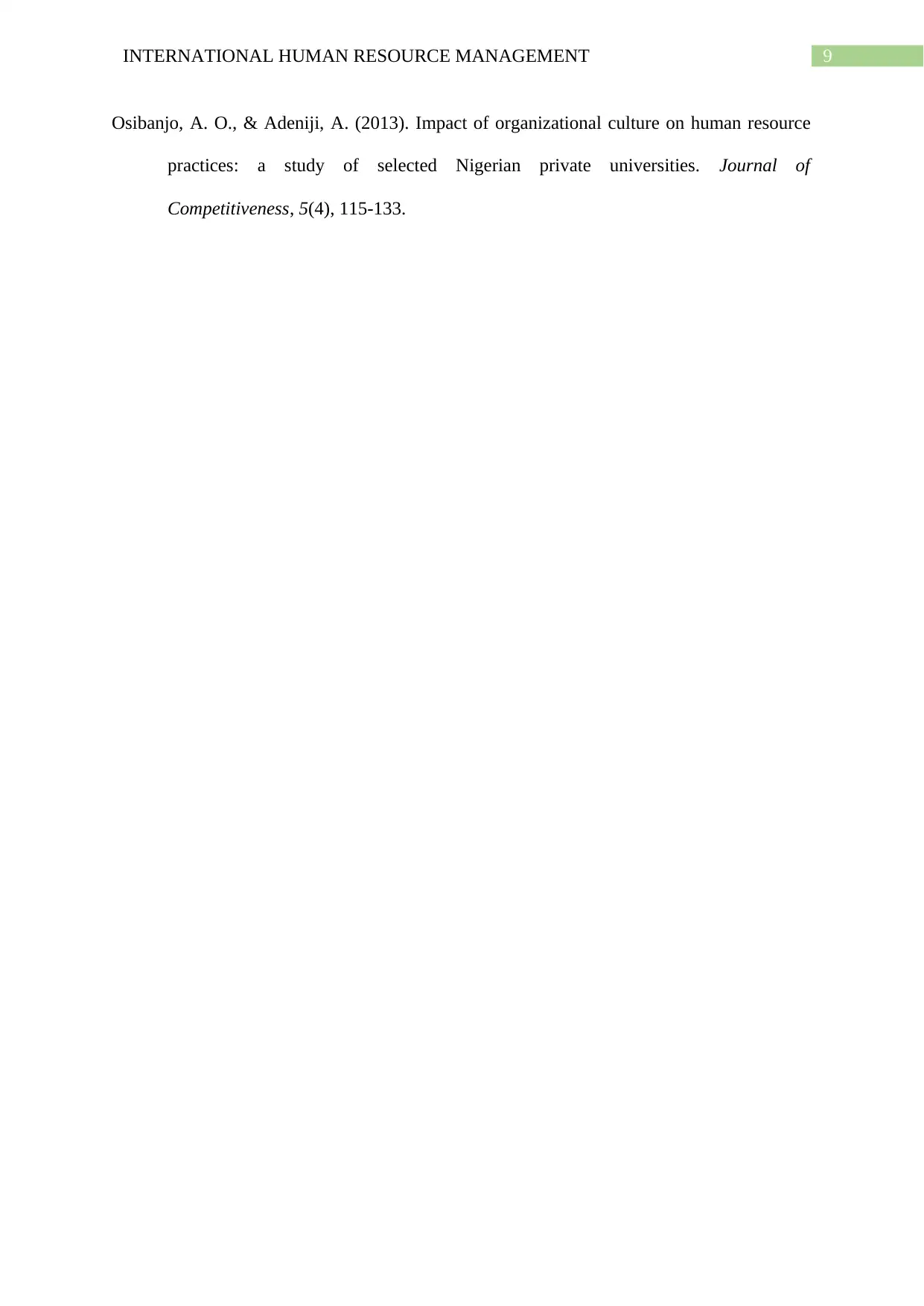
9INTERNATIONAL HUMAN RESOURCE MANAGEMENT
Osibanjo, A. O., & Adeniji, A. (2013). Impact of organizational culture on human resource
practices: a study of selected Nigerian private universities. Journal of
Competitiveness, 5(4), 115-133.
Osibanjo, A. O., & Adeniji, A. (2013). Impact of organizational culture on human resource
practices: a study of selected Nigerian private universities. Journal of
Competitiveness, 5(4), 115-133.
1 out of 10
Related Documents
Your All-in-One AI-Powered Toolkit for Academic Success.
+13062052269
info@desklib.com
Available 24*7 on WhatsApp / Email
![[object Object]](/_next/static/media/star-bottom.7253800d.svg)
Unlock your academic potential
Copyright © 2020–2026 A2Z Services. All Rights Reserved. Developed and managed by ZUCOL.





